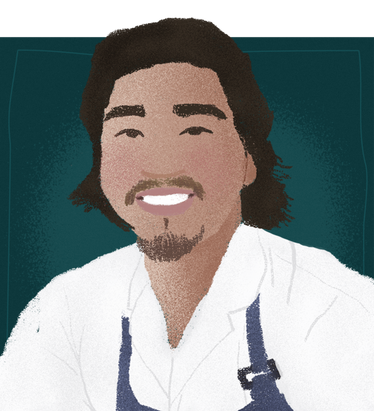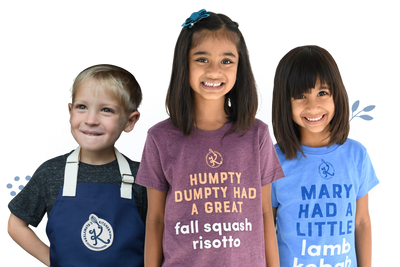
Taste Bud Profile
Edward Lee

One could easily spend an afternoon just listing the incredible restaurants, accolades, and initiatives Chef Edward Lee has worked on throughout this career. What I loved about our conversation, however, was how his drive to work, help, and explore has been with him his whole life. There's something really inspiring about having the humility to be a constant student in the face of so much success, particularly when the goal is to help all ships rise.



Edward Lee: I grew up in Canarsie, in Brooklyn. At the time, it had been a very Polish/Jewish/Italian neighborhood, and was becoming more Jamaican/Caribbean, but there weren’t a lot of Asian families there. Even then, it was such a hodge-podge of immigrant communities. I grew up surrounded by that, but also in a very Korean household. My grandmother did most of the cooking, and I remember our kitchen being very traditional—lots of funky smells, homemade sauces, and always kimchi. We ate rice pretty much three times a day, and I remember eating warm bowls of rice and the smell of kimchi wafting through the house, with my grandmother always in the kitchen chopping, marinating things, making food for us. There was always something on the stove, simmering. Those are some of my earliest memories about food. Out in my neighborhood, that’s where I really got to explore. In the same day I could just walk around and get Jamaican beef patties, (though we didn’t call them Jamaican beef patties—they were just beef patties), a slice of pizza, and Polish sausages. I grew up not knowing that they weren’t from the US. I thought it was all American food for me—or really, I just thought it was all food. In high school, when I started meeting people from other neighborhoods and other backgrounds, I started realizing it. I became aware that people didn’t eat curry one day, Chinese food the next, Polish food and Korean food and on and on. It was the first time I realized that most people didn’t eat with such a diversity of options. Back then I didn’t realize it was diversity at all—because it was just normal to me.

In many ways I was very fortunate to grow up in that environment, with those smells, those flavors, those different cultures, and the street markets. Much later, I realized that all of those things were probably kind of important for my appreciation for food. It was always attention grabbing for me—it was such a strong sensory memory.
Even being surrounded by it in our neighborhood, though, the rest of my family never really ate anything other than our food at home, with the exception of my sister, who would take me to explore the markets but would always only get pizza. She let me get whatever I wanted. That curiosity, or obsession maybe, was sort of unique to me in my family. My parents worked all the time, so we had no real supervision. We’d get our allowance and we just went out and did whatever we wanted with it. Between the diversity in the neighborhood, the incredible wealth of what the immigrant families brought to community, and our relative autonomy without our parents being around—it was kind of a cool way to grow up. I guess now we’d see it slightly differently. But back then, it was a remarkable way to explore the neighborhood, and the people.
At home, even with my parents working all the time, there was always someone to eat dinner with me. Often it would just be my grandmother and me, but there was always some ritual to eating.

People always ask what the inspiration was for me starting to cook. Some of it can definitely be credited to my grandmother because she was just in the kitchen all the time, but truly I know that I’ve always been fascinated by food. There’s no real explanation, no real epiphany moment. The best I can do is to say that sometimes you’re just born with a curiosity for something and it sticks to you. I remember when I got a little older, I always wanted to know what my grandmother was doing in the kitchen. But she was so traditional, and she didn’t want me in the kitchen with her because she still had this idea that the kitchen was a woman’s place and that I should go outside and play sports. She was always bugging my older sister to learn all the family recipes, which never worked. I love my sister, but she can’t even boil water for ramen. She has never cared about food in the same way I do.
I could never convince my grandmother to share her recipes with me. I spent a lot of time struggling to get information—trying to steal her recipes, and figure out what she was doing without her knowing. We were very close, but she just didn’t get it. Towards the end of her life she did see me cook in professional kitchens, but I don’t think she ever fully understood that I had chosen to make this my life.
I was really raised by my mother, my grandmother, and my sister. These three women were all very strong and independent in their own ways, and I can look back and really appreciate what they all did for me. They were just action people. They just stepped up and did everything. They worked, they supported their family, they made dinner. They didn’t sit around and think about what they had to do, they just did it. They were extremely hardworking, and even when odds were against them, they never stopped. I get all of that work ethic from my mom and my grandma. I think I’m the kind of guy who would just keep piling sandbags against a flood, past the point of logic. We’re a family of workers.
When I think back on the way I absorbed my surroundings in my own childhood, I think the takeaway is that exposure is everything. Expose your kids to everything, even if you think it’s uncomfortable.
You can’t predict how they’re going to take it. You might not consider going to a Tibetan restaurant because you think your kid might not like it. But for a 7 year old, it could be life changing. It could open up doors. We don’t know how kids will respond. Take my parents—they had no idea what was happening when they were unwittingly exposing me to Jamaican food and everything else around me when I was a kid. We don’t see the world through kids’ eyes anymore, and kids absorb things in a completely different way than we do. It’s deep. It’s ingrained.
Expose your kids to different foods, tastes, smells. You can’t predict where those experiences will lead them, but you have to give them the chance to do it.
Think about a bigger picture when you take them to a restaurant with another cultural perspective. For example, one of my favorite memories was going to a Vietnamese restaurant and meeting the owner, and hearing about how he had fled Saigon and come to America with nothing, and taught himself English by spending hours in the library. He put his two children through medical school from running this restaurant, and he had no formal Vietnamese recipes—he was just recreating the food his mother made. That’s the value of exposure. It’s not just about any one thing you’ll eat—it’s about memories, connections, and stories that make you appreciate the larger world. I guarantee there’s a Vietnamese restaurant, or a Chinese, or Indian, or Ethiopian restaurant nearby where you can travel to that country through their food, and you don’t have to leave the town you’re in. Go there and start asking questions. Start ordering and eating things you haven’t had before. In terms of taking risks, taking a risk with an unfamiliar food is the absolute easiest risk you can take. So take it, expose yourself and your kids, and keep learning together.
Food is a gateway to culture, and to people—it starts with food, but the great thing is it doesn’t end there.

